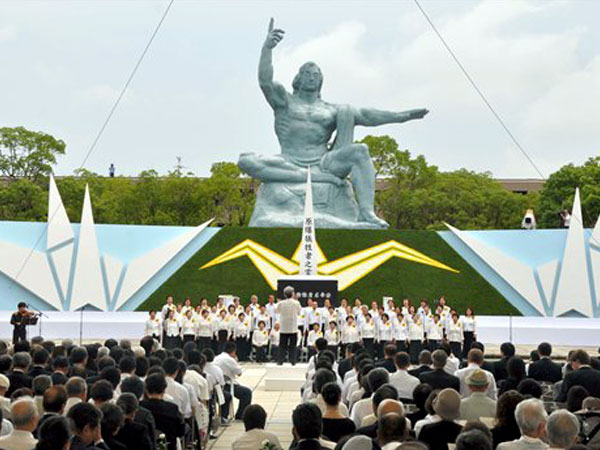Nagasaki marks anniversary of atomic bomb attack

A ceremony is held in front of the Statue of Peace at Nagasaki Peace Park in Nagasaki, southern Japan Thursday, Aug. 9, 2012 to mark the 67th anniversary of the world’s second atomic bomb attack. (AP Photo/Kyodo News)
TOKYO — Japanese officials pledged Thursday to seek a society less reliant on nuclear energy as the country marked the 67th anniversary of the atomic bombing of Nagasaki.
About 6,000 people gathered at a peace park near the epicenter of the 1945 blast, including students and the mayor of one of the towns most affected by last year’s nuclear disaster.
Almost a year and half after the world’s second worst accident at a nuclear power plant, concerns about the safety of nuclear energy and radiation effects persist.
Nagasaki Mayor Tomihisa Taue said the accident at the Fukushima Dai-ichi plant, which was struck by a tsunami last March, has revealed the risk of nuclear technology.
Taue urged Japan to map out concrete plans to achieve a nuclear-free society where people don’t need to worry about the effects of radiation. He also called for renewed commitment to a global ban on nuclear weapons.
Article continues after this advertisement“Many people in Fukushima still live in fear of radiation effects,” Taue said.
Article continues after this advertisementPrime Minister Yoshihiko Noda renewed his promise to seek a society less reliant to nuclear power in a mid to long-term policy platform due out within weeks.
“We will compile an energy structure that would reassure the safety of the people,” he said.
Japan is compiling its energy policy for the next two decades. Noda’s government is making a decision on how much Japan should reduce the share of nuclear energy by 2030.
Within a three day period in 1945, the U.S. dropped two atomic bombs on Japan, first on Hiroshima, killing 140,000 people, and then on Nagasaki, killing 70,000. The attacks prompted Japan’s World War II surrender.
The United States sent its ambassador, John Roos, to Nagasaki for the first time this year, a year after his deputy attended the ceremony.